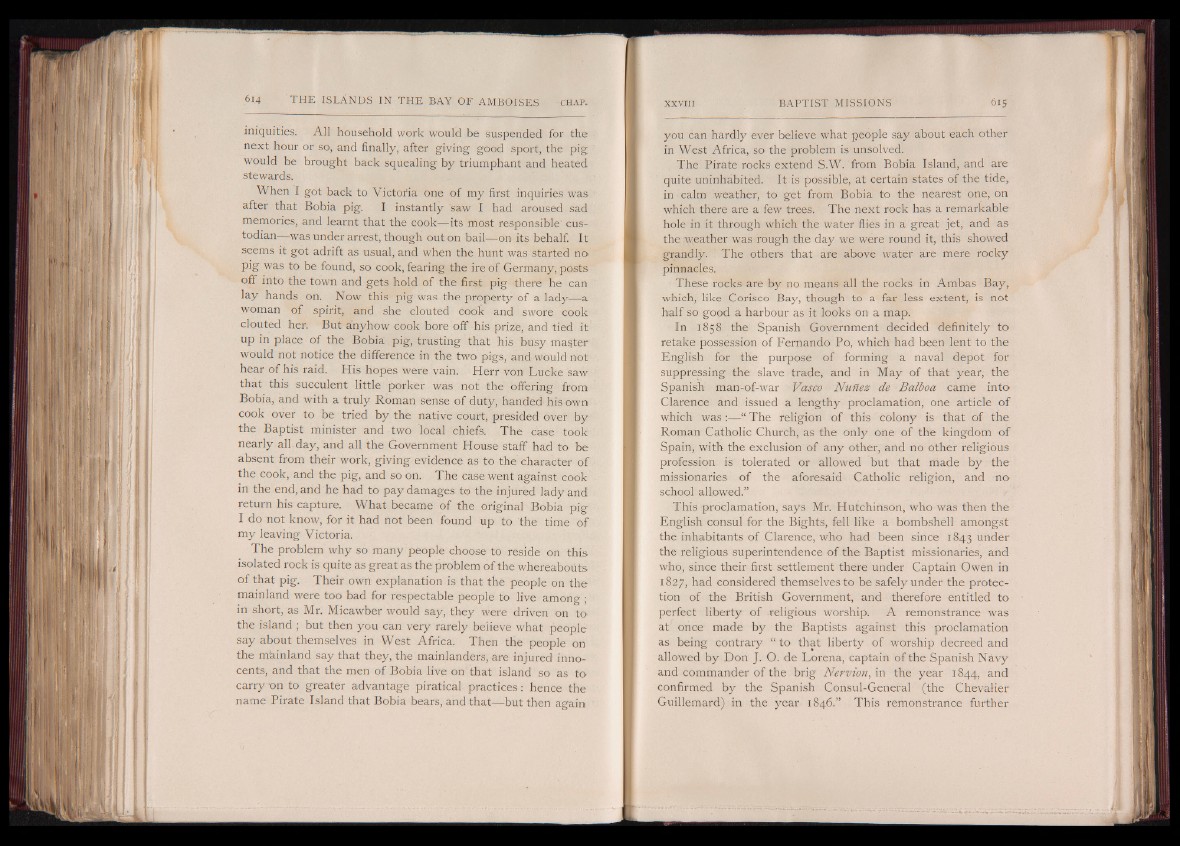
iniquities. All household work would be suspended for the
next hour or so, and finally, after giving good sport, the pig
would be brought back squealing by triumphant and heated
stewards.
When I got back to Victoria one of my first inquiries was
after that Bobia pig. I instantly saw I had aroused sad
memories, and learnt that the cook— its most responsible custodian—
was under arrest, though out on bail— on its behalf. It
seems it got adrift as usual, and when the hunt was started no
pig was to be found, so cook, fearing the ire of Germany, posts
off into the town and gets hold of the first pig there he can
lay hands on. Now this pig was the property of a lady— a
woman of spirit, and she clouted cook and swore cook
clouted her. But anyhow cook bore off his prize, and tied it
up in place of the Bobia pig, trusting that his busy master
would not notice the difference in the two pigs, and would not
hear of his raid. His hopes were vain. Herr von Lucke saw
that this succulent little porker was not the offering from
Bobia, and with a truly Roman sense of duty, handed his own
cook over to be tried by the native court, presided over by
the Baptist minister and two local chiefs. The case took
nearly all day, and all the Government House staff had to be
absent from their work, giving evidence as to the character of
the cook, and the pig, and so on. The case went against cook
in the end, and he had to pay damages t© the injured lady and
return his capture. What became of the original Bobia pig
I do not know, for it had not been found up to the time of
my leaving Victoria.
The problem why so many people choose to reside on this
isolated rock is quite as great as the problem of the whereabouts
of that pig. Their own explanation is that the people on the
mainland were too bad for respectable people to live among;
in short, as Mr. Micawber would say, they were driven on to
the island ; but then you can very rarely beiieve what people
say about themselves in West Africa. Then the people on
the mainland say that they, the mainlanders, are injured innocents,
and that the men of Bobia live on that island so as to
carryon to greater advantage piratical practices: hence the
name Pirate Island that Bobia bears, and that— but then again
you can hardly ever believe what people say about each other
in West Africa, so the problem is unsolved.
The Pirate rocks extend S.W. from Bobia Island, and are
quite uninhabited. It is possible, at certain states of the tide,
in calm weather, to get from Bobia to the nearest one, on
which there are a few trees. The next rock has a remarkable
hole in it through which the water flies in a great jet, and as
the weather was rough the day we were round it, this showed
grandly. The others that are above water are mere rocky
pinnacles.
These rocks are by no means all the rocks in Ambas Bay,
which, like Corisco Bay, though to a far less extent, is not
half so good a harbour as it looks on a map.
In 1858 the Spanish Government decided definitely to
retake possession of Fernando Po, which had been lent to the
English for the purpose of forming a naval depot for
suppressing the slave trade, and in May of that year, the
Spanish man-of-war Vasco Nunez de Balboa came into
Clarence and issued a lengthy proclamation, one article of
which was:— “ The religion of this colony is that of the
Roman Catholic Church, as the only one of the kingdom of
Spain, with the exclusion of any other, and no other religious
profession is tolerated or allowed but that made by the
missionaries of the aforesaid Catholic religion, and no
school allowed.”
This proclamation, says Mr. Hutchinson, who was then the
English consul for the Bights, fell like a bombshell amongst
the inhabitants of Clarence, who had been since 1843 under
the religious superintendence of the Baptist missionaries, and
who, since their first settlement there under Captain Owen in
1827, had considered themselves to be safely under the protection
of the British Government, and therefore entitled to
perfect liberty of religious worship. A remonstrance was
at once made by the Baptists against this proclamation
as being contrary “ to that liberty of worship decreed and
allowed by Don J. O. de Lorena, captain of the Spanish Navy
and commander of the brig Nervion, in the year 1844, and
confirmed by the Spanish Consul-General (the Chevalier
Guillemard) in the year 1846.” This remonstrance further